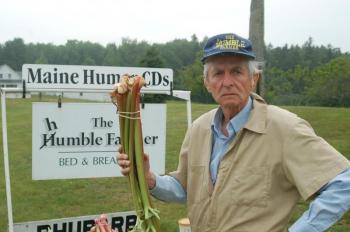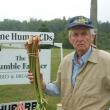Robert Skoglund turns 80
Nearing 80, Maine humorist, farmer, musician, columnist, linguist, teacher and radio/television personality Robert Skoglund, better known as “The humble Farmer,” is anything but humble as he looks forward to his octogenarian years.
He is preparing for a big 80th birthday party, inviting friends and readers of his Portland Press Herald humor column to join him at his house in St. George. He is also selling bunches of rhubarb to pay for a new solar panel. A master of multitasking, he is planning his weekly radio and television programs and learning how to self-publish a book of his newspaper columns.
“I have invited a couple hundred thousand. Maybe 30 will show up,” Skoglund.
Skoglund is harkening back to 1982 when he first invited hundreds of newspaper editors to a free lobster bake in his backyard as a way of promoting his syndicated humor column. From a dozen guests the first year, the event mushroomed as an annual destination for musicians, entertainers, politicians and celebrities.
At its peak, the party was held under an enormous tent with a full-sized stage for the entertainers and a crew of 50 volunteers as cooks, servers and parking attendants.
"Everybody had a number, so there was no waiting in lines," said Skoglund. "It was a great marketing tool.”
It worked. Skoglund gained national recognition for his comic monologues. He became highly sought after for radio interviews and his bookings boomed.
“In 1988 I was giving three talks a week," he said.
Skoglund admits that those days are now a memory. His bookings have dwindled in part because of chronic health problems and he no longer self-promotes as he once did.
He abandoned the annual lobster bake bake in 1992.
"She shut it down," said Skoglund referring to Marsha, his wife of 24 years, but better known to his radio fans as the “almost perfect woman.”
Robert Skoglund was born Jan. 8, 1936, the son of a Swedish immigrant.
"We lived seven houses down the road," he said.
The attending doctor charged two dollars. As a child he suffered from undiagnosed allergies that were later attributed to cats and farm animals.
"I didn't know I would live to be 30 years old," said Skoglund.
He was the only student in his high school class to gain a college degree. His classmates in Rockland considered higher education a waste of time.
“Only rich kids went to college,” he said of the prevailing attitude.
It took Skoglund several tries on his way to a master’s degree in linguistics, starting with an attempt to be a music student. Along the way he learned to play several instruments and mastered a half dozen languages. He also traveled to Sweden where he stayed several months with his father's family learning to speak Swedish with a Maine accent.
In 1963, after serving a stint in the Coast Guard stationed in Rockland, he saw a notice in the paper that Maine was short 300 teachers.
"Maybe I can teach school," he surmised. He took a job teaching in Lee.
Skoglund bought a Model T Ford and was hanging out on the docks in Tenants Harbor when three college girls came off a yacht.
“I was like a piece of bait in a skunk trap," said Skoglund.
Anne Galey, a Vassar graduate, never reboarded the yacht. They were married and built a house in Boothbay Harbor and bought a house in St. George. The couple reentered college and taught school together until one day Anne took an assignment for Down East Magazine to go to Beals Island to interview a lobsterman.
When she did not return after three months, Skoglund figured the marriage was over.
At that point, Skoglund bought himself a Mercedes car and a tractor and began bush-hogging fields for his neighbors while teaching special education at Medomak Valley High School.
While on the tractor he came up with ideas for his newspaper column and for off-color personal ads that he posted in the Maine Times.
In 1978, Skoglund was invited to host a recorded jazz and commentary program for Maine Public Radio. It was a voluntary gig.
“Every week I would drive to Orono,” he said.
After technology advanced years later, he was able produce the program from his home first on tape and then on CDs. He eventually became syndicated in Miami and New Mexico. The program ended after MPBN accused Skoglund of including political content in his program. His friends rallied for a hearing in Lewiston, but the program was canceled in 2006.
“Every time MPBN has a fund drive now, two or three people send me a check,” said Skoglund, who is still bitter about the way it was handled.
He has continued to produce his radio and television programs, which are available online and on public access stations.
Skoglund has become an advocate for the use of solar energy. He started with a solar hot water system and now has a bank of solar cell panels for electricity which he feeds back to the CMP grid when the sun shines and collects back when it is cloudy.
“Hopefully, my rhubarb sales will pay for my next panel,” he said. He estimates the cost at $1,900.
Event Date
Address
United States
































